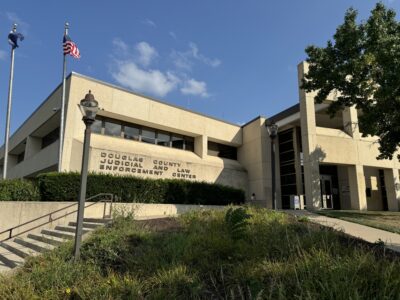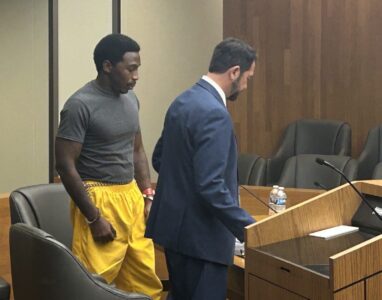Pretrial Supervision official isn’t sure how much of an impact Trump’s executive order against cashless bail will have in Douglas County

photo by: Josie Heimsoth/Journal-World
The Judicial Law Enforcement Center, located at 111 E. 11th St., houses the Douglas County Sheriff's Office.
A Trump administration executive order is threatening to withhold federal funding to communities that offer “cashless bail” programs, but a leader with Douglas County’s Pretrial Supervision program isn’t sure how much of an impact it will have here.
On Monday, President Donald Trump signed the executive order, which claims that allowing cashless bail is a threat to public safety. The order would terminate federal grants and contracts provided to jurisdictions with cashless bail programs. It instructs Attorney General Pam Bondi to submit within 30 days “a list of States and local jurisdictions that have, in the Attorney General’s opinion, substantially eliminated cash bail as a potential condition of pretrial release from custody for crimes that pose a clear threat to public safety and order, including offenses involving violent, sexual, or indecent acts, or burglary, looting, or vandalism.”
It remains to be seen whether Douglas County will end up on such a list.
The county does have a program dedicated to providing alternatives to jail for certain defendants who are awaiting the resolution of their cases. It’s called Pretrial Supervision, and although the county’s director of criminal justice services, Pam Weigand, has heard concerns about the executive order, she’s not sure if it will affect Douglas County that much.
Weigand said she was unsure whether the District Court received federal funds, and thus what effect any termination of federal funds might have.
How Pretrial Supervision operates also could factor into whether the order has an impact here. Weigand said the system, which has been in place since 2017, reviews every case of an incarcerated person before their first appearance in court and provides information to the court about the likelihood that those individuals would appear at future court dates and if they are a “criminal liability.”
But then, the decision on what to do is governed by state laws, which sometimes allow judges to use their judgment.
Sharon Brett, an associate professor of law at the University of Kansas, said that many jurisdictions require judges to set bail for certain offenses. But Weigand said there are also times when a judge is allowed to put someone on house arrest or release the person on their own recognizance, meaning they would not be required to pay anything to get out of jail but may still have to pay if they fail to appear in court.
Either way, Weigand said state laws play a big role in these decisions, and “the executive order doesn’t change the rules of the states.”
The executive order claims that in jurisdictions with cashless bail, law enforcement is sometimes “forced to arrest the same individuals, sometimes for the same crimes, while they await trial on the previous charges.” But Brett said that cashless bail programs don’t just release every defendant, and that the decision is made based on whether the person poses a risk to public safety or is a flight risk.
What the decision is not based on, Brett said, is whether the person can afford to pay. In places that require cash bail, Brett said many people — especially people with low income — will be “forced to remain incarcerated until their case goes to trial” because they can’t afford to get out.
Weigand said that while some people believe violent defendants could be let out without posting bail and commit more violent crimes, in practice that is “just not the case.” She said a cash bond ends up having nothing to do with ensuring people’s attendance in court and just hurts low-income people.
“(Having) cash bond makes it so people of lower means are unable to bond out,” Weigand said.
Brett said that while the government has the authority to create conditions for grant recipients seeking federal funding, she believes there will be legal challenges to Trump’s executive order.
She said the executive order is best understood as an “attack on criminal justice reform policies.” Many criminal justice reforms started in “Democratic strongholds like Chicago,” she said — areas that the Trump administration has repeatedly accused of being soft on crime. In Chicago in particular, Trump has recently described the city as a “killing field” and threatened to deploy National Guard troops, as The Associated Press reported.
The executive order, Brett said, is a “concerning intervention into something typically left to the states and cities.”





